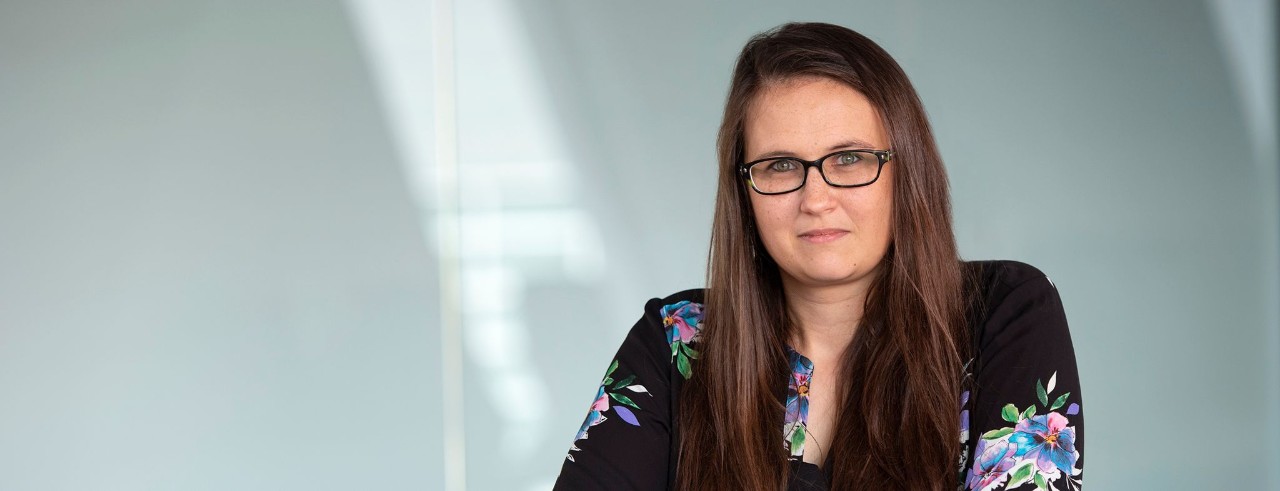
UC Answers: How are UC labs fighting COVID-19?
Lab supervisor describes the extent of the effort behind COVID-19 research at UC
"We’re excited because we work for an organization that supports research well and we’re headed in the right direction with the research that we’re doing," says Kristin Weghorn, senior research assistant and lab supervisor in the virology lab in the UC College of Medicine Division of Infectious Diseases.
She is leading the behind-the-scenes efforts to process samples from the many and varied COVID-19-related research projects at UC. Since the pandemic hit earlier this year, she and her colleagues have worked non-stop around the clock to help researchers try to find treatments and a cure for the novel coronavirus.
Q: How is UC impacting the COVID fight through its research labs?
Weghorn: UC is impacting the COVID fight through many aspects of research. I would say if you’re involved in any sort of research at UC, your attention has shifted to COVID-19. At the end of the day, it’s all about patient care. UC has placed patients at the forefront of everything they do around COVID-19. It’s all been about patient care and serving the community.
Q: There must be a great deal of pressure on researchers to make breakthroughs related to COVID. Can you share your view of these efforts?
Weghorn: There is a great deal of pressure on researchers to impact COVID-19. We have all been overwhelmed and busy with research but also there is some level of excitement and anticipation because ultimately the work we do on the front end affects the research on the back end. We want this research to be successful. We don’t want to put out sloppy results, and we want to put out quality work.
Q: What might surprise the average person about this work?
Weghorn: This work is tedious, it’s very time-consuming. You have time constraints to produce viable cells and process samples. Because this is a pandemic which surprised us all, we’ve had to almost reinvent the wheel on some processes and adapt as we go because it’s ever-changing, but at the same time put out quality work. The quality of the work over the quantity of the work is going to impact this research at the end of the day.
Q: Can you give us an idea of how many people are involved in COVID research at UC, and what kind of hours are they working?
Weghorn: People are working 60- to 80-plus hours, and I think the front line workers are ultimately the most affected by this. We have been in the lab for the entire pandemic, we have been doing research the entire time. There is a lot of stress and a lot of pressure, but if you keep at the forefront of your mind why you got into this role to begin with, that being taking care of patients and serving the community, it makes it worth it.
Q: What’s the general feeling of the research teams? Excitement, exhilaration, hope—how would you describe the mood?
Weghorn: There’s a little bit of a feeling of being overwhelmed, exhausted and overworked, but there’s also a level of anticipation and excitement for what’s to come. We’re excited because we work for an organization that supports research well, and we’re headed in the right direction with the research that we’re doing. That’s the reason we got into research, to serve the community.
Featured photo of Kristin Weghorn, taken by Colleen Kelley/UC Creative + Brand.
Discover more about clinical trials
UC is involved in many trials that are dependent upon members of our community and their willingness to take part as a patient. Read about UC's first dose of a COVID-19 vaccine. Share your desire to get involved in this important trial, or find more UC Answers to your important questions.
Related Stories
Before the medals: The science behind training for freezing mountain air
February 19, 2026
From freezing temperatures to thin mountain air, University of Cincinnati exercise physiologist Christopher Kotarsky, PhD, explained how cold and altitude impact Olympic performance in a recent WLWT-TV/Ch. 5 news report.
Blood Cancer Healing Center realizes vision of comprehensive care
February 19, 2026
With the opening of research laboratories and the UC Osher Wellness Suite and Learning Kitchen, the University of Cincinnati Cancer Center’s Blood Cancer Healing Center has brought its full mission to life as a comprehensive blood cancer hub.
Nursing innovation emerges as critical lever in healthcare transformation
February 18, 2026
Recognizing both the urgency and the opportunity, the University of Cincinnati (UC) College of Nursing is taking deliberate steps to position nurses at the forefront of healthcare transformation. It has created an Innovation Strategic Plan and established a dedicated Industry Advisory Board to forge the academic-industry partnerships essential to accelerating nurse-driven innovation.
